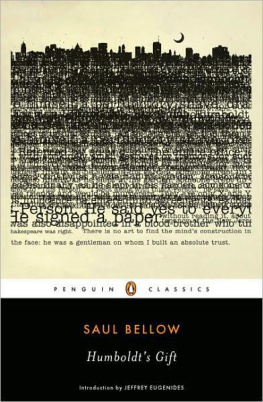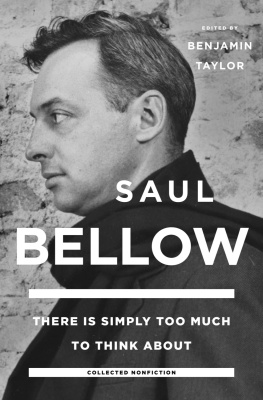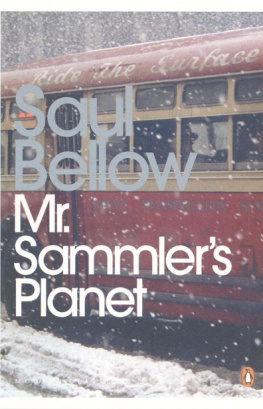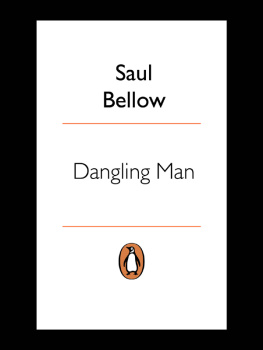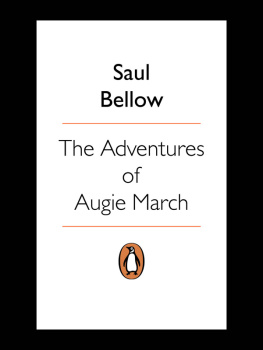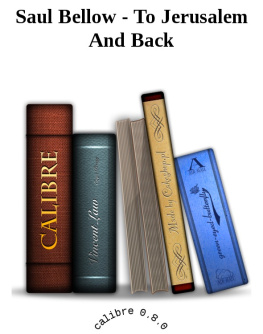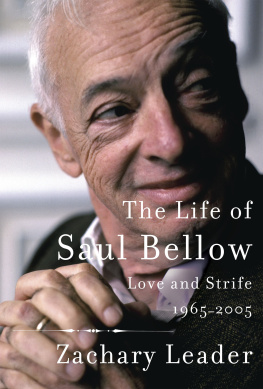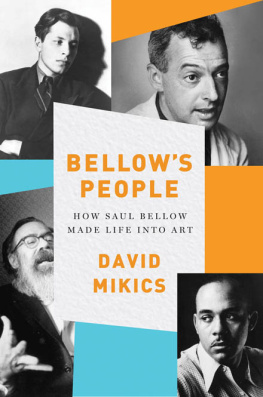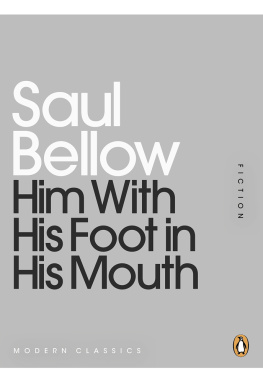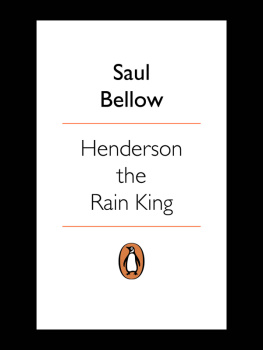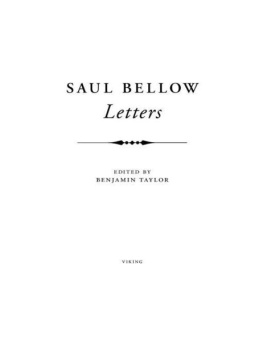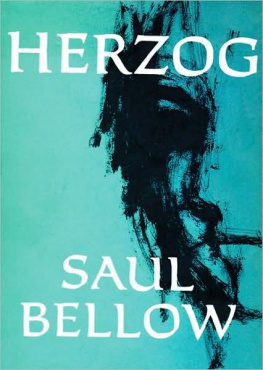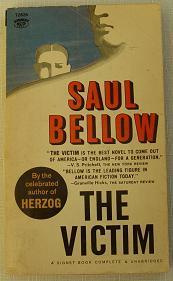Saul Bellow - Humboldts Gift
Here you can read online Saul Bellow - Humboldts Gift full text of the book (entire story) in english for free. Download pdf and epub, get meaning, cover and reviews about this ebook. publisher: Penguin, genre: Detective and thriller. Description of the work, (preface) as well as reviews are available. Best literature library LitArk.com created for fans of good reading and offers a wide selection of genres:
Romance novel
Science fiction
Adventure
Detective
Science
History
Home and family
Prose
Art
Politics
Computer
Non-fiction
Religion
Business
Children
Humor
Choose a favorite category and find really read worthwhile books. Enjoy immersion in the world of imagination, feel the emotions of the characters or learn something new for yourself, make an fascinating discovery.
- Book:Humboldts Gift
- Author:
- Publisher:Penguin
- Genre:
- Rating:3 / 5
- Favourites:Add to favourites
- Your mark:
- 60
- 1
- 2
- 3
- 4
- 5
Humboldts Gift: summary, description and annotation
We offer to read an annotation, description, summary or preface (depends on what the author of the book "Humboldts Gift" wrote himself). If you haven't found the necessary information about the book — write in the comments, we will try to find it.
Humboldts Gift — read online for free the complete book (whole text) full work
Below is the text of the book, divided by pages. System saving the place of the last page read, allows you to conveniently read the book "Humboldts Gift" online for free, without having to search again every time where you left off. Put a bookmark, and you can go to the page where you finished reading at any time.
Font size:
Interval:
Bookmark:
Saul Bellow
Humboldt's Gift
First published in 1973
The book of ballads published by Von Humboldt Fleisher in the Thirties was an immediate hit. Humboldt was just what everyone had been waiting for. Out in the Midwest I had certainly been waiting eagerly, I can tell you that. An avant-garde writer, the first of a new generation, he was handsome, fair, large, serious, witty, he was learned. The guy had it all. All the papers reviewed his book. His picture appeared in Time without insult and in Newsweek with praise. I read Harlequin Ballads enthusiastically. I was a student at the University of Wisconsin and thought about nothing but literature day and night.
Humboldt revealed to me new ways of doing things.
I was ecstatic. I envied his luck, his talent, and his fame, and I went east in May to have a look at him - perhaps to get next to him. The Greyhound bus, taking the Scranton route, made the trip in about fifty hours. That didn't matter. The bus windows were open. I had never seen real mountains before. Trees were budding. It was like Beethoven's Pastorale. I felt showered by the green, within.
Manhattan was fine, too. I took a room for three bucks a week and found a job selling Fuller Brushes door to door. And I was wildly excited about everything. Having written Humboldt a long fan letter, I was invited to Greenwich Village to discuss literature and ideas. He lived on
Bedford Street, near Chumley's. First he gave me black coffee, and then poured gin in the same cup. "Well, you're a nice-looking enough fellow, Charlie," he said to me."Aren't you a bit sly, maybe? I think you're headed for early baldness. And such large emotional handsome eyes. But you certainly do love literature and that's the main thing. You have sensibility," he said.
He was a pioneer in the use of this word.
Sensibility later made it big. Humboldt was very kind. He introduced me to people in the Village and got me books to review. I always loved him.
Humboldt's success lasted about ten years. In the late Forties he started to sink. In the early Fifties I myself became famous. I even made a pile of money. Ah, money, the money!
Humboldt held the money against me. In the last years of his life when he wasn't too depressed to talk, wasn't locked up in a loony bin, he went about New York saying bitter things about me and my "million dollars."
"Take the case of Charlie Citrine. He arrived from Madison, Wisconsin, and knocked on my door. Now he's got a million bucks. What kind of writer or intellectual makes that kind of dough--a Keynes? Okay. Keynes, a world figure. A genius in economics, a prince in Bloomsbury," said Humboldt. "Married to a Russian ballerina. The money follows. But who the hell is Citrine to become so rich? We used to be close friends," Humboldt accurately said.
"But there's something perverse with that guy. After making this dough why does he bury himself in the sticks?
What's he in Chicago for? He's afraid to be found out."
Whenever his mind was sufficiently clear he used his gifts to knock me. He did a great job.
And money wasn't what I had in mind. Oh God, no, what I wanted was to do good. I was dying to do something good. And this feeling for good went back to my early and peculiar sense of existence--sunk in the glassy depths of life and groping, thrillingly and desperately, for sense, a person keenly aware of painted veils, of Maya, of domes of many-colored glass staining the white radiance of eternity, quivering in the intense inane and so on. I was quite a nut about such things. Humboldt knew this, really, but toward the end he could not afford to give me any sympathy. Sick and sore, he wouldn't let up on me. He only stressed the contradiction between the painted veils and the big money. But such sums as I made, made themselves. Capitalism made them for dark comical reasons of its own. The world did it.
Yesterday I read in The Wall Street Journal about the melancholy of affluence, "Not in all the five millennia of man's recorded history have so many been so affluent." Minds formed by five millennia of scarcity are distorted. The heart can't take this sort of change. Sometimes it just refuses to accept it.
In the Twenties kids in Chicago hunted for treasure in the March thaw. Dirty snow hillocks formed along the curbs and when they melted, water ran braided and brilliant in the gutters and you could find marvelous loot--bottle tops, machine gears, Indian-head pennies. And last spring, almost an elderly fellow now, I found that I had left the sidewalk and that I was following the curb and looking.
For what? What was I doing? Suppose I found a dime? Suppose I found a fifty-cent piece?
What then? I don't know how the child's soul had gotten back, but it was back. Everything was melting.
Ice, discretion, maturity. What would Humboldt have said to this?
When reports were brought of the damaging remarks he made I often found that I agreed with him. "They gave Citrine a Pulitzer prize for his book on Wilson and Tumulty. The Pulitzer is for the birds--for the pullets. It's just a dummy newspaper publicity award given by crooks and illiterates. You become a walking Pulitzer ad, so even when you croak the first words of the obituary are "Pulitzer prizewinner passes."
" He had a point, I thought. "And Charlie is a double Pulitzer. First came that schmaltzy play. Which made him a fortune on Broadway. Plus movie rights. He got a percentage of the gross!
And I don't say he actually plagiarized, but he did steal something from me--my personality. He built my personality into his hero."
Even here, sounding wild, he had grounds, perhaps.
He was a wonderful talker, a hectic nonstop monologuist and improvisator, a champion detractor. To be loused up by Humboldt was really a kind of privilege. It was like being the subject of a two-nosed portrait by Picasso, or an eviscerated chicken by Soutine. Money always inspired him. He adored talking about the rich.
Brought up on New York tabloids, he often mentioned the golden scandals of yesteryear, Peaches and Daddy Browning, Harry Thaw and Evelyn Nesbitt, plus the Jazz Age, Scott Fitzgerald, and the Super-Rich. The heiresses of Henry James he knew cold. There were times when he himself schemed comically to make a fortune. But his real wealth was literary. He had read many thousands of books. He said that history was a nightmare during which he was trying to get a good night's rest.
Insomnia made him more learned. In the small hours he read thick books--Marx and Sombart, Toynbee, Rostovtzeff, Freud. When he spoke of wealth he was in a position to compare Roman luxus with American Protestant riches. He generally got around to the Jews--Joyce's silk-hatted Jews outside the Bourse.
And he wound up with the gold-plated skull or death mask of Agamemnon, dug up by Schliemann. Humboldt could really talk.
His father, a Jewish Hungarian immigrant, had ridden with Pershing's cavalry in Chihuahua, chasing Pancho Villa in a Mexico of whores and horses (very different from my own father, a small gallant person who shunned such things). His old man had plunged into America. Humboldt spoke of boots, bugles, and bivouacs. Later came limousines, luxury hotels, palaces in Florida. His father had lived in Chicago during the boom. He was in the realestate business and kept a suite at the Edgewater Beach Hotel.
Summers, his son was sent for. Humboldt knew Chicago, too. In the days of Hack Wilson and Woody English the Fleishers had a box at Wrigley Field. They drove to the game in a Pierce-Arrow or a Hispano-Suiza (humboldt was car-crazy). And there were lovely John Held, Jr., girls, beautiful, who wore step-ins. And whisky and gangsters and the pillared doom-dark
La Salle Streetbanks with railroad money and pork and reaper money locked in steel vaults. Of this Chicago I was completely ignorant when I arrived from Appleton. I played Piggie-move-up with Polish kids under the El tracks. Humboldt ate devil's-food coconut-marshmallow layer cake at Henrici's. I never saw the inside of Henrici's.Next pageFont size:
Interval:
Bookmark:
Similar books «Humboldts Gift»
Look at similar books to Humboldts Gift. We have selected literature similar in name and meaning in the hope of providing readers with more options to find new, interesting, not yet read works.
Discussion, reviews of the book Humboldts Gift and just readers' own opinions. Leave your comments, write what you think about the work, its meaning or the main characters. Specify what exactly you liked and what you didn't like, and why you think so.

